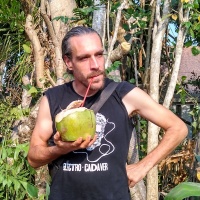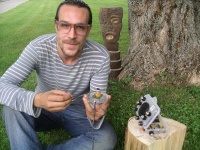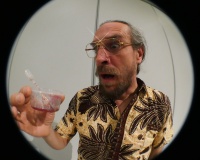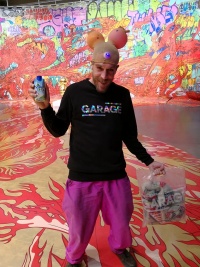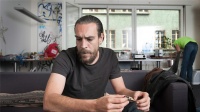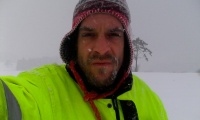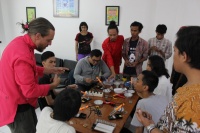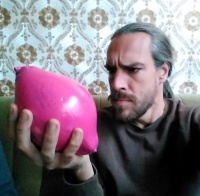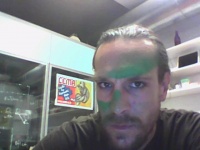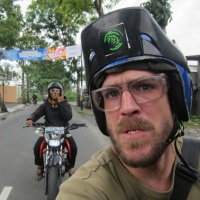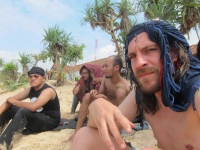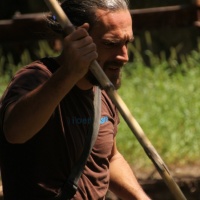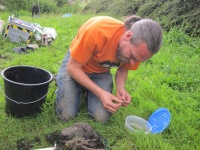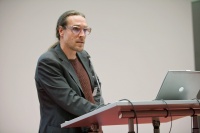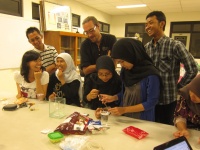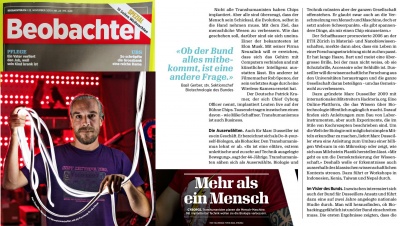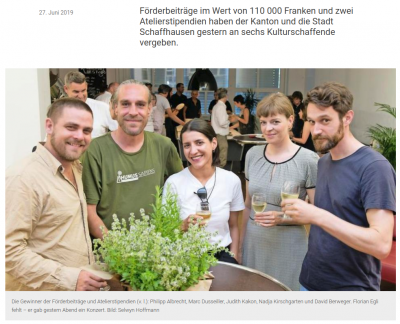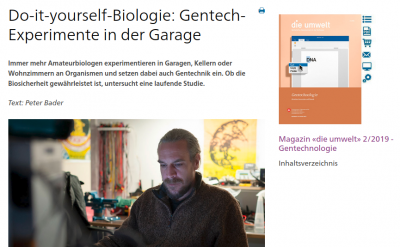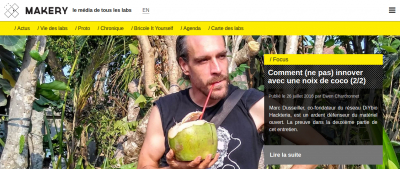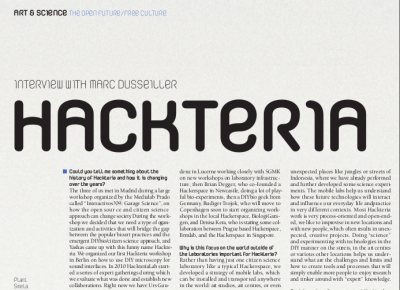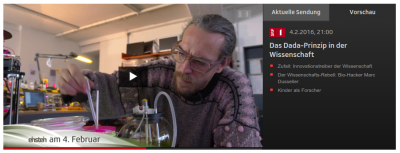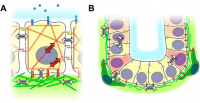Dusjagr
Contents
- 1 Marc Dusseiller - Biography
- 2 Short Biography
- 3 Ultra Short Biography
- 4 Videos / Interviews
- 4.1 'Mehr als ein Mensch' Beobachter, Nils Hänggi, Nov 2019
- 4.2 'Förderbeiträge KulturRaum Schaffhausen' Schaffhauser Nachrichten, Juni 2019
- 4.3 BAFU Magazin «die umwelt» 2/2019 - Gentechnologie
- 4.4 Marc 是谁 on Wechat, by Vivi for SZOIL
- 4.5 Marc Dusseiller on Workshops
- 4.6 Karkhana: Makers Hackers or Slackers, Interview by Sabhyata Timsina
- 4.7 Makery: Marc Dusseiller, Biohack Pioneer & Coconut Researcher
- 4.8 The Art of Open and Free Science, MCD #68, 2012, Ed. A. Delfanti, Interview S. Tocchetti
- 4.9 SRF Einstein - Der Wissenschafts-Rebell: Bio-Hacker Marc Dusseiller, 2016
- 4.10 Seni Gotong Royong*: HackteriaLab 2014 - Yogyakarta
- 4.11 PlayAround 09 – TechNomads, Taiwan (Documentary)
- 4.12 Interview / Documentary on Hackteria (2010), German with Engl. subtitles
- 5 Articles
Marc Dusseiller - Biography
Download full biography hereor this version in German/English.
Dr. Marc R. Dusseiller is a transdisciplinary scholar, lecturer for micro- and nanotechnology, cultural facilitator and artist. He performs DIY (do-it-yourself) workshops in lo-fi electronics and synths, hardware hacking for citizen science and DIY microscopy. He also loves coconuts. He was co-organizing Dock18, Room for Mediacultures, diy* festival (Zürich, Switzerland), KIBLIX 2011 (Maribor, Slovenia), workshops for artists, schools and children as the former president (2008-12) of the Swiss Mechatronic Art Society, SGMK and co-founder of the new Hackerspace collective Bitwäscherei (2020) in Zürich. He has worked as guest faculty and mentor at various schools, Srishti Institute of Art, Design and Technology (IN), UCSB (USA) and in Switzerland, FHNW, HEAD, ETHZ. In collaboration with Kapelica Gallery, he has started the BioTehna Lab in Ljubljana (2012 - 2013), an open platform for interdisciplinary and artistic research on life sciences. Currently, he is developing means to perform bio- and nanotechnology research and dissemination, Hackteria | Open Source Biological Art, in a DIY / DIWO fashion in kitchens, ateliers and in the Majority World. He was the co-organizer of the different editions of HackteriaLab 2010 - 2020 Zürich, Romainmotier, Bangalore, Yogyakarta and Klöntal, Okinawa and collaborated on the organisation of the BioFabbing Convergence, 2017, in Geneva and the Gathering for Open Science Hardware, GOSH! 2016, Geneva & 2018, in Shenzhen.
- http://hackteria.org
- http://openhardware.science
- http://www.mechatronicart.ch
- http://www.randelab.ch
- http://8bitmixtape.cc
- http://www.dusseiller.ch/labs (outdated)
Short Biography
More geeky
Marc Dusseiller aka dusjagr is a nomadic researcher and workshopologist. He is part of the Center for Alternative Coconut Research, co-founder of SGMK, Bitwäscherei Hackerspace Collective and the Hackteria network. Before travelling the world for making DIY / DIWO laboratories for creative biological experimentation with living media, Marc entered the world of DIY electronics, designing printed circuit boards for synthesizers and organizing workshops and festivals mostly in Zürich, Taipei and Yogyakarta. He also loves coconuts.
More kinda schoolish
Marc Dusseiller aka dusjagr is a nomadic researcher and workshopologist. He is part of the Center for Alternative Coconut Research and co-founder of SGMK, Bitwäscherei Hackerspace Collective and the Global Hackteria Network, Co-organiser of GOSH, Gathering for Open Science Hardware. He loves making DIWO laboratories for creative biological experimentation and works in an integral way, combining science, art and education. He has worked as guest faculty and mentor at various schools, Srishti Institute of Art, Design and Technology, Bangalore (IN), UCSB (USA) and in Switzerland, FHNW, HEAD, ETHZ, HSLU. He lives and works in Zürich, Yogyakarta and Taipei. He also loves synhtesizers and coconuts.
Ultra Short Biography
Marc Dusseiller aka dusjagr is a nomadic researcher and workshopologist, Co-founder of SGMK and Ambassador of the Global Hackteria Network. He also loves synhtesizers and coconuts.
Videos / Interviews
'Mehr als ein Mensch' Beobachter, Nils Hänggi, Nov 2019
CYBORGS. Transhumanisten planen die Mensch-Maschine. Mit implantierter Technik wollen sie die Biologie verbessern.
"Die Auserwählten. Auch für Marc Dusseiller ist es ein Geschäft. Er bezeichnet sich als Do-it-yourself-Biologen, als Biohacker. Den Transhumanismus lehnt er ab. «Es ist eine elitäre, extrem unkritische und zu sehr auf Technik ausgelegte Bewegung», sagt der 44-Jährige. Transhumanisten sähen sich als Auserwählte. Biologie und Technik müssten aber der ganzen Gesellschaft offenstehen. Er glaubt zwar auch an die Verschmelzung von Mensch und Maschine, doch er setzt andere Schwerpunkte. «Es gibt spannendere Dinge, als mir einen Chip einzusetzen.» ... Dusseiller will die wissenschaftliche Forschung aus den Universitäten heraustragen und die ganze Gesellschaft daran beteiligen – um das Gemeinwohl zu verbessern."
"Im Visier des Bunds. Inzwischen interessiert sich auch der Bund für Dusseillers Ansatz und führt dazu eine auf zwei Jahre angelegte nationale Studie durch. Man will herausfinden, ob Biohacking gefährlich ist und der Bund einschreiten muss. Die ersten Ergebnisse zeigten, dass die Szene ungefährlich sei, sagt Basil Gerber, stellvertretender Sektionschef Biotechnologie. «Biohacker führen kleine Experimente durch. Und sie machen sich durchaus Gedanken um ihre Experimente. Ob der Bund aber alles mitbekommt, ist natürlich die andere Frage.»"
Download full article: File:Reportage_Mehr als ein Mensch.pdf
'Förderbeiträge KulturRaum Schaffhausen' Schaffhauser Nachrichten, Juni 2019
27. Juni 2019: Förderbeiträge im Wert von 110 000 Franken und zwei Atelierstipendien haben der Kanton und die Stadt Schaffhausen gestern an sechs Kulturschaffende vergeben. Marc Dusseiller werden 28'000 Franken zugesprochen. Den Förderbeitrag erhält er zur Weiterentwicklung des Netzwerkes von Hackteria/Open Source Biological Art. Das Projekt will Kooperationen zwischen Künstlern und Naturwissenschaftlern ermöglichen und somit Kunst und Naturwissenschaft näher zusammenbringen.
https://www.shn.ch/region/kanton/2019-06-27/foerdergelder-als-entscheidende-puzzleteile Download here
BAFU Magazin «die umwelt» 2/2019 - Gentechnologie
Am Ende des Gesprächs muss die Frage doch noch gestellt werden: «Sind Sie eigentlich ein Rebell?» Ja, antwortet Marc Dusseiller, ohne zu zögern, das könne man schon sagen. Dies hört sich ein bisschen gefährlicher an, als es tatsächlich ist. Es bedeutet: Der 43-jährige Schaffhauser beschreitet aussergewöhnliche Wege. Er promovierte in Material- und Nanobiowissenschaften und absolvierte danach ein Postdocstudium in Robotik. Weil er «immer sehr an der interdisziplinären Arbeit interessiert» war, konnte sich Marc Dusseiller eine klassische Forscherkarriere mit engem Themenspektrum nicht vorstellen. Er verliess die Universität 2006 und arbeitet seither als freischaffender Dozent und Veranstalter von Workshops. Er experimentierte zudem mit elektronischer Musik und wurde Mitbegründer der Schweizerischen Gesellschaft für Mechatronische Kunst (SGMK) in Zürich.
Direkt zum Artikel "Do-it-yourself-Biologie: Gentech-Experimente in der Garage"
Marc 是谁 on Wechat, by Vivi for SZOIL
Marc Dusseiller on Workshops
As a co-founder of Hackteria.org and classically trained scientist, Marc Dusseiller has been the initiator of several events and gatherings on the topic of DIY, DIWO, biohacking, bioart, and workshop pedagogy. In particular the HackteriaLab events emphasize interdisciplinary collaboration and cultural impact (footage features HLab14: Yogyakarta and Bio-Commons Lab at RuralHub, Italy).
Karkhana: Makers Hackers or Slackers, Interview by Sabhyata Timsina
I sat down with Marc on the last day of K_space to chat about his work and ended up having a long conversation about the socio-political meaning of hacking, the direction in which the maker movement is headed, hacking as a teaching method and gender dynamics within the technical field. The interview, transcribed below, is a great explainer on what making and hacking looks like outside of the vacuum of technical fields and instead embedded within society, politics and history.
http://www.karkhana.asia/stories/makers-hackers-or-slackers/
Download the document here
Makery: Marc Dusseiller, Biohack Pioneer & Coconut Researcher
Long and two part interview by Ewen Chardronnet for Makery done during Interactivos?16, June 2016, published in French and English in July 2016
Part 1 Marc Dusseiller, biohack pioneer: This summer, we’re traveling with Swiss globetrotter Marc Dusseiller, who cofounded Hackteria, the international open source network of biohackers and bioartists. In this first part, the ex-researcher in nanotechnology talks about how the DIYbio movement came to Europe and founding Hackteria in India in 2009.
Marc Dusseiller, biohack pioneer (1/2)
Part 2 How to (not) innovate with a coconut: Marc Dusseiller, co-founder of the DIYbio network Hackteria, is a passionate promoter of open hardware. This is all the more evident in part 2 of our interview, where the activist scientist talks about the DIY microscope and the propaganda of innovation, which led him to create the Center for Alternative Coconut Research.
How to (not) innovate with a coconut (2/2)
The Art of Open and Free Science, MCD #68, 2012, Ed. A. Delfanti, Interview S. Tocchetti
http://www.digitalmcd.com/mcd-68-la-culture-libre-the-open/
Download the extracted pages from the Open Science section here.
Could you explain what is Open Source Biological Art and how it relates to DIY biology?
Whether it is a wiki or a workshop or both doesn’t really matter, what is essential is to enable people to collaborate and shaer knowle edge and instructions. Open Source Biological Art enables people to perform complex scientific protocols without the support of an official institution. We believe that it is important to enable more people to feel confident in working with living systems in order for creative and new ideas to emerge. When applied to science and art, it can create a new type of public participation and understanding of both domains.
What is your view on the future of citizen science?
My hope is that if more people are making things with their hands and have this direct and everyday experience with scientific protocols, we can demystify science and open the whole decision making process to more people and opinions. I think this is the future society, where I want to live, a place where tinkerers and lay people find new and unexpected uses and functions of technologies and scientific knowledge, where they hack it and adapt it to their dreams and lives and don’t wait for some big corporation or government to decide what is good or safe for them.
SRF Einstein - Der Wissenschafts-Rebell: Bio-Hacker Marc Dusseiller, 2016
Marc Dusseiller hat seine erfolgreiche Forscherkarriere hingeschmissen und ist Biohacker geworden. Er experimentiert in seinem Heimlabor, verbindet Wissenschaft und Kunst und will damit die breite Masse für die Biologie begeistern. Der Querdenker bewegt sich zwischen Anarchismus, Kunst und Wissenschaft. «Einstein» zeigt in einem Portrait wie der Biohacker Würste zum Leuchten bringt und gibt Einblick in die noch junge Bewegung der „do it yourself“-Biologie.
See Documentary on Swiss TV (mbe not available globally)
Seni Gotong Royong*: HackteriaLab 2014 - Yogyakarta
HackteriaLab 2014 – Yogyakakarta is a two-weeks making-oriented gathering of researchers, artists, scientists, academicians, hackers and whatevers in Yogyakarta. It was hosted by LIFEPATCH - citizen initiative in art, science and technology and co-organized together with HACKTERIA | Open Source Biological Art in collaboration with various regional partners. As a web and community platform, Hackteria tries to encourage scientists, hackers and artists to collaborate and combine their expertise, write critical and theoretical reflections, share simple instructions to work with life science technologies and cooperate on the organization of workshops, festival and meetings.
Produced and directed by X-Code films, this documentary was made during the two weeks of HackteriaLab 2014 – Yogyakarta. It offers you a glimpse of (almost) everything that happens and documents the participants wish list for future collaborations and works.
PlayAround 09 – TechNomads, Taiwan (Documentary)
PlayAround 09 – TechNomads – was the second edition of an intensely parallel and collaborative workshop of mediating the creative use of FLOSS (Free/Libre Open Source Software) and DIY practices to an audience of emerging artists of diverse backgrounds. It combines the knowledge creation and open distribution of new media technologies and contemporary art practices in a socially responsible and relevant context.
Interview / Documentary on Hackteria (2010), German with Engl. subtitles
Video produced by Migros Kulturprozent and Christoph Merian Verlag for the DVD publication "Digital Culture and Media Art from Switzerland – Edition 2010". You can find the full publication on digital brainstorming: http://www.digitalbrainstorming.ch/programm/dvd2010
Articles
Good old times... when dusjagr was still writing papers!
HACKTERIA.ORG: NOMADIC SCIENCE AND DEMOCRATIZED LABS - SEAD White Papers, by Denisa Kera and Marc Dusseiller
We perceive the collaboration between science, engineering, arts and design for us as serving one main function: it increases and tests new models of public participation and engagement in science and technology and introduces a greater reflexiveness in the whole R&D and appropriation processes. Instead of communicating and disseminating results, on which scientists and policy makers eventually agree, we are interested in an experimental approach for policy deliberation, where all parties have an active role in the whole R&D process and where science is probed against many other fields and interests – social, aesthetic, political, philosophical, even culinary.
